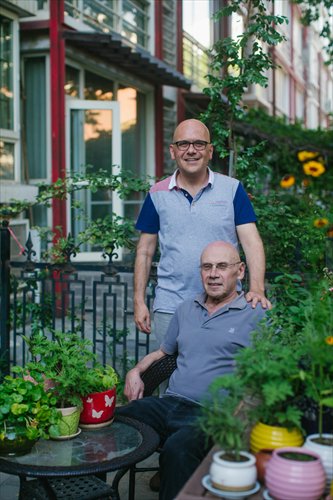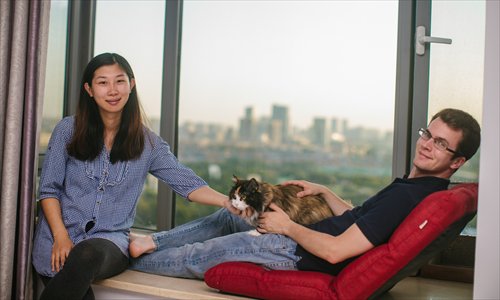HOME >> METRO BEIJING
With its local flavor cheaper cost of living, Beijing’s far-flung Tongzhou district is drawing a growing number of expats
By Chen Ximeng Source:Global Times Published: 2016/6/20 20:08:01

Gordon Dumoulin and his 70-year-old father, who is currently visiting, enjoy his small garden. Photp: Li Hao/GT
Standing in the shady, stone-paved patio of his private courtyard, Gordon Dumoulin gestures to a garden bed filled with sturdy young plants - rosemary, oregano, sage, thyme. Nearby, tomato plants hang heavy with plump, reddening fruit. It isn't just a hobby for Dumoulin, who runs a company that sells natural health ingredients derived from organic botanicals; it's an oasis."When I am sitting in the garden during summer evenings, enjoying a nice red wine with some friends or visitors and people pass by, I hear them murmur, 'These foreigners know how to enjoy life,'" he laughs.
It's the kind of serene, laidback lifestyle that, for most city dwellers, exists only in jaunts to the countryside or weekend getaways. But for Dumoulin, it's just part of his everyday life in Tongzhou, a farflung district in Eastern Beijing that, more and more, is becoming home to expats looking for an escape from the capital's chaotic city center.
It was something of an accident that led Dumoulin to Tongzhou, where he's made his home for the past six years. When the 45-year-old sales and marketing expert from the Netherlands first moved to Beijing in 2009, he lived in Sanlitun, a commercial hub and expat enclave known for its international-brand stores, flashy bars and upscale restaurants. After just six months, though, he'd had enough. "I felt like it was lacking a real taste of China," he said.
Yet it wasn't a desire for local culture that led Dumoulin to Tongzhou, but rather a happy accident. He decided to launch his company there after a friend mentioned that he had connections there who could help Dumoulin with the complicated registration process.
He soon found an apartment in Bobo Free City, a quiet residential community near the Grand Canal, that offered better terms than most people could hope for in Beijing's city center - 90 square meters of space with charming old character and his own private garden, all for just 3,500 yuan ($531) per month.
And then there was the draw of the area itself. "Tongzhou is still a typical district within Beijing with its own personality, characteristics and atmosphere. It feels more like a separate city," said Dumoulin. "Living in Tongzhou is more relaxed, greener, closer to the countryside and you feel like you have more of a connection with local people and the community."
However, that may change soon. The central government last year released plans to relocate Beijing's government offices from the downtown to Tongzhou in an effort to reduce congestion in the city center. The move, which defines Tongzhou as the sub-center of Beijing, is expected to have a huge impact on Tongzhou's population, real estate prices and jobs growth, not to mention its commercial landscape and infrastructure.
Better life quality and job opportunities
While many foreigners write Tongzhou off from the start (if they've even heard of it), because of its distance from downtown Beijing, others are drawn to its more practical perks - convenient public transportation, relatively low rent, and its abundance of green spaces.
For Dumoulin, the latter is a major advantage. "It is a pleasure to live here, being close to Tongzhou Canal Park and the countryside. It is more relaxed here and feels closer to nature," said Dumoulin, who often enjoys biking or jogging along the Grand Canal at sunset.
For Peter Jones, a 35-year-old Brit with a Chinese wife and a daughter, Tongzhou proved attractive thanks to its lower costs and better quality of living.
"We used to live in Piao Home (an apartment hotel complex) in Jiuxianqiao. The apartments there are in really bad condition. The only way to upgrade the quality in that area is to move complexes, which more than doubles the rent. It's not reasonable. Our current home is a lot nicer, well decorated and very quiet," said Jones. They pay about 5,000 yuan per month now; in Jiuxianqiao, by contrast, they paid 6,000 yuan.
Jones added that although the two apartments are almost the same size, the Tongzhou flat offers a more attractive interior. The neighborhood is also quieter and more spacious, with easy access to shops, restaurants, gyms, a swimming pool and a large park.
Another advantage is the fact that the couple can enroll their four-year-old daughter in Golden Kids, a Chinese international kindergarten group where Jones now works as head of foreign teachers. The good quality of the school was another major factor in their decision to move.
Wang Lifu, a Beijing rental agent for foreigners, said that recently Tongzhou has seen an influx of foreigners drawn by the area's growing demand for English teachers.
"Thanks to the sub-center initiative, we will see an increasing number of foreigners living in Tongzhou," Wang said. "The major factors influencing their going or staying are job opportunities based in Tongzhou, the commercial atmosphere, like commercial centers, and traffic."

Though Wayne Watterson and his Chinese wife, who bought an apartment in Tongzhou in 2014, admit that the area offers little in the way of international culture, they are more optimistic about its development prospects. Photo: Li Hao/GT
Living like a localBut it isn't just economic and lifestyle factors drawing foreigners to Tongzhou; many also cite its community and "local feel" as an important attraction.
Dumoulin, for example, is active in his residential community, running a small English Club for local kids on the weekends, in which he teaches them about foreign cultures in English. Sometimes, he also organizes movie nights for the kids or dinner parties for Chinese neighbors featuring French or Italian food.
"Living in Tongzhou, it's easier to be in touch with local people than it is in the busy centers," he said. "It feels sometimes more like a village where people care for each other." He added that Tongzhou has significantly less foreign influence than the central districts in Beijing such as Chaoyang, meaning that it offers a more "Chinese" experience.
Italian transplant Eva Sara, a teacher at an international kindergarten and an artiest who has been in Beijing for 10 years, also enjoys the serene, neighborhood feel of Tongzhou, where she's been living for the last five years.
She recalled once when she was returning home from shopping, and a neighbor who repairs bikes reminded her that her bike tire needed fixing. As she was loaded down with groceries, another neighbor helped her bring the bike to him. In the end, her mechanic neighbor refused payment, saying, "You are worth it as my neighbor."
"At that time, I felt home," she said.
Looking into the future: mixed prospects
Of course, living in Tongzhou isn't always a bed of roses. Just ask Wayne Watterson, a 31-year-old American teacher who has been living in Jingmao Guojicheng, near the Grand Canal, for two years. Every morning, he has to get up at the break of dawn to make it to his office in Chaoyang district by 7:45 am.
It isn't just his daily commute. Watterson also complains about Tongzhou's lack of Western supermarkets, foreign cuisine and international hospitals, which is an issue especially now that his wife, a native Beijinger, is five months pregnant.
"Sometimes we have to go to several markets to get what we want for dinner if foreign friends come for a gathering, or else we have to take them to a Muslim food restaurant near our home," said Watterson. Almost every weekend, he and his wife go to Chaoyang district to go to church, Western supermarkets like Jenny Lou's, or their favorite Western restaurants.
Despite the inconveniences, Watterson and his wife bought an apartment there in 2014, both because of its superior schooling options and its projected development.
According to the government's plans, government offices in Tongzhou will be accompanied by top public schools, universities, public and international hospitals, cultural institutions and more. The government also plans to build a new CBD area near the Grand Canal.
"Although we need some time to get adjusted to life in Tongzhou as it is still developing, we are more optimistic about the prospects for its development as a sub-center," said Watterson.
Jones, too, is optimistic. "There is meant to be a Hilton opening next year, so maybe we'll have somewhere to go for an all-you-can-drink champagne buffet!" he joked.
"Seriously though, I have been coming to Tongzhou for four years now, and have seen a big change. The environment has changed quickly, the people are changing a little slower. It is very noticeable when traveling downtown how much more 'cosmopolitan' it is."
Yet veteran Tongzhou transplants like Dumoulin have mixed feelings over its rapid development.
"Tongzhou feels like and is my home. I don't feel like an expat but more like an immigrant. I have no plans to leave Tongzhou, although when it gets too crowded, maybe I will move further out toward the countryside," said Dumoulin. "It [becoming a sub-center] will certainly change the atmosphere with positive and less positive influences. Maybe some typical Tongzhou characteristics will disappear when lots of new people arrive, both Chinese and foreigners. But every development will also bring positive things and more diversity to the community."
Newspaper headline: Living on the edge
Posted in: Metro Beijing